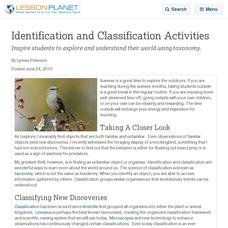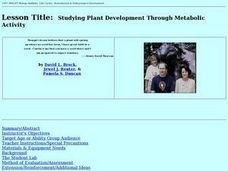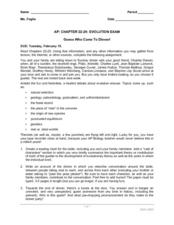Curated OER
Polymerase Chain Reaction and DNA Profiling
Students examine DNA fingerprinting and polymerase chain reaction and how they are used in everyday life and for criminal investigations. They discover how these techniques can also be used to answer ecological and evolutionary questions.
Curated OER
Animal Forms
Learners demonstrate similarities and differences in animal forms, including humans.They investigate geometric relationships within those forms by building an animal using Zome System elements.
Curated OER
Diversity and Adaptation
Tenth graders explore structure, function and variation among species. Through field observations, lab activities and homework, 10th graders observe and record examples of adaptation and variation.
Curated OER
How do new species form?
Tenth graders conduct a critical analysis of current evolutionary concepts. They describe how scientists continue to investigate theories. Students examine examples with experimental data that suggest alternative methods of species...
Curated OER
Tutti Frutti
Get some competition going in your life science class. Give lab groups a variety of plant parts, all of them fruits, except one. Their mission is to make observations, compare and contrast, in order to be the first to identify the...
Curated OER
Communication in Bees
Eighth graders identify and interpret a scientific investigation and a hypothesis through experimentation and testing a hypothesis. They identify what scientists hypothesized about the communication of stingless bees. Finally, 8th...
Curated OER
Birds of Different Feathers: Species Specialization
Young scholars identify differences in bird species and explain the concept of species specialization. They attain the knowledge that different birds occupy different habitats.
Students identify characteristics and features of birds that...
Curated OER
Introduction to Biomes
Eighth graders identify the different kinds of biomes. In this life science lesson, 8th graders explain their importance in an ecosystem. They take a BrainPop quiz at the end of the lesson..
Curated OER
What Should You Know about Classification?
Many learners have a tough time picking out pertinent information from a text or in class. Sometimes, all it takes is a study/reading guide to show them the way. The worksheet here focuses on taxonomy and classification, including...
National Center for Case Study Teaching in Science
A Strange Fish Indeed
Communication is one of the most important aspects of science. In a two-day activity, your high school or college-level biologists will read excerpts from a fictional diary of Marjorie Courtenay-Latimer, the woman who discovered the...
Curated OER
Primate Evolution
In this primate evolution activity, students will review the structures and functions that are characteristic of primates. Students will identify the differences between Old World monkeys, New World monkeys, and prosimians. This activity...
Curated OER
The "How's and Whys" of Animal Behavior
Students read examples of behaviors in various animals. They design an experimental question about the behavior. They explain if the question involves the proximate or ultimate level of causation.
Curated OER
Identification and Classification Activities
Explore and understand your world with taxonomy.
NOAA
Please Pass the Salt
Salinity is the focus of two experimenters that work to answer the question, How does salt change the physical properties of water? Super scientists compare the freezing rate of salt and fresh water, combine the two waters to...
Curated OER
Studying Plant Development Through Metabolic Activity
A hands-on activity which allows students to learn about cellular respiration. This instructional activity contains a range of investigations testing the rates of cellular respiration to demonstrate the relationship between metabolic...
Curated OER
Protists
In this protists learning exercise, students compare and contrast the different types of funguslike protists: slime molds, water molds, and downy mildews. This learning exercise has 1 short answer and 7 fill in the blank questions.
Curated OER
Window Gardens
Learners use a plastic sandwich bag containing a damp paper towel taped to a window as a model system to observe the germination and early growth of radish seeds. They are challenged to pose a question about seed germination and growth...
Curated OER
Human Population's Response to Re-emerging and Emerging Infectious Diseases
Students examine the human population response to microbial diseases. In this disease activity students observe population trends, write about a scientist and evaluate and defend current treatments for infectious diseases.
Curated OER
Time Conceptualization
Students use this activity to establish a new mode of reference to the conceptualization of time. To present hominid evolution in terms of millions of years and endosymbiosis of eukaryotes in billions of years carries little meaning to...
Curated OER
Comparing Theories: Lamarck and Darwin
Students compare the evolution theories of Lamarck and Darwin. They use self-assessment and a video to increase their knowledge of evolution theories. They research questions and present them to the class.
Curated OER
Guess Who Came to Dinner!
An exceptionally creative approach is taken to assessing your biologists' grasp of natural selection concepts. They are to imagine hosting Charles Darwin for dinner and having, to their surpise, a few other noted scientists crash the...
Curated OER
Cellular Respiration stage 1: Glycolysis
Ten reactions involved with the process of glycolysis within cellular respiration are summarized here. The aerobic stages and anaerobic interactions leading to fermentation are detailed and wonderful diagrams to support the information...
Curated OER
All in the Family: Calculating Cousins
Students view pictures of distant "cousins" to humans. They place them in order by their distance from humans. Students receive a packet of six pages featuring graphics and a cousins summary page. They work in groups to complete 5 cousin...























